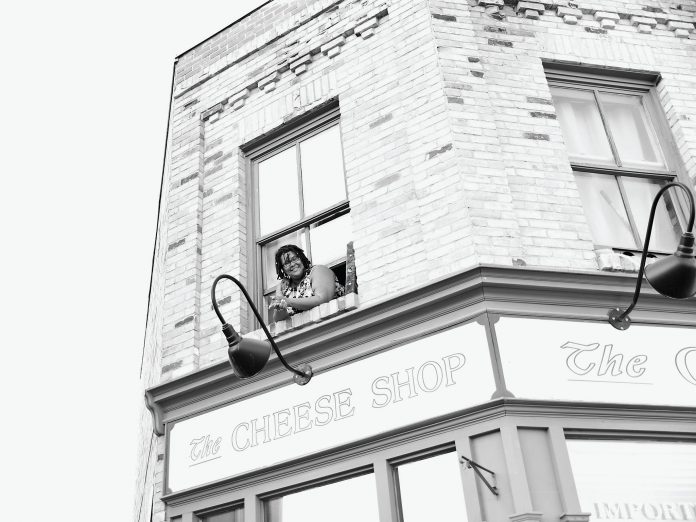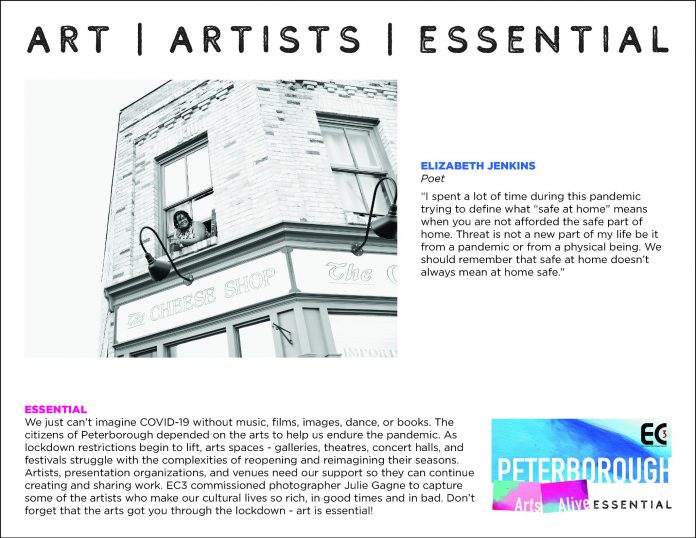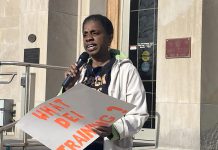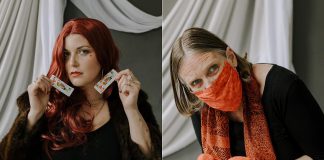
On August 31st, the Electric City Culture Council (EC3) in Peterborough launched “Essential”, a photography project that raises awareness of the precarious situation of local artists and arts organizations during the COVID-19 pandemic.
Part of EC3’s Peterborough Arts Alive initiative, the Essential project is a series of 17 photos by local photographer Julie Gagne that depicts 20 local artists during the pandemic. Each of the photos feature an artist or artists in their home or workplace and is accompanied by an artist statement about their experience of the pandemic.
Twice each week until the end of October, kawarthaNOW is publishing photos from the series. Today, we feature poet Elizabeth Jenkins.
Elizabeth Jenkins, Poet

A message from EC3 about The Essential Project
The 2020 COVID-19 pandemic has had a profound impact on both individual artists and arts organizations in Peterborough. Performance venues and galleries have been closed, concerts cancelled, exhibitions postponed, entire seasons abandoned. Organizations and facilities are trying to grapple with the loss of revenue and an uncertain future. “Reopening” is not straightforward, to say the least.
Individual artists have lost their creative income and the opportunity to work together to create — something that is absolutely vital to them and to their audiences. Many have pivoted, and developed and presented some great virtual and digital projects. But nothing replaces live performance in front of a live audience and the catalytic energy that comes from being together to rehearse, discuss, and plan projects, to gather at an opening or artist talk.
Isolated at home, cut off from their communities and the lifeblood that is their artistic practice, local artists still found ways to keep our cultural life alive. Silenced and almost invisible, they kept working. But it hasn’t been easy.
Local photographer Julie Gagne began photographing a number of Peterborough residents in their homes during the earlier stage of the pandemic and posted the photos on Facebook. The eloquent, haunting images of her “Within” portrait project included some artists, and those incredibly moving images caught the eye of EC3 executive director Su Ditta.
Julie’s photos made us think. We have all benefited from the work of artists during the pandemic: we’ve listened to music, read books, watched films, toured virtual exhibitions, tuned in to living room concerts. What has it been like for the artists? Will people remember how essential the arts were to getting through the pandemic when it comes to recovery funding and budget planning? Will arts organizations be supported in a robust recovery plan?
EC3 asked theatre artist Sarah McNeilly to curate and coordinate, and approached Julie Gagne to do a distinct series of photos that spoke to the experience of local artists and what art means to our lives, in good times and in bad. It’s essential.
This arts awareness project is both a witness to the struggles of, and a testament to the courage and contributions of this community during the COVID-19 lockdown. Our heartfelt thanks go out to Julie and everyone in the arts community who have kept us going.


























